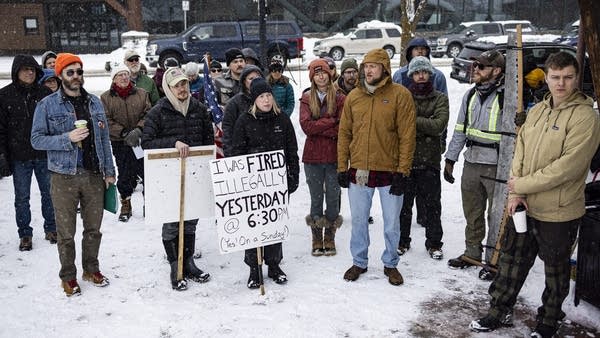In rural western mountain towns, Forest Service layoffs deliver a gut punch

It was a postcard snowy day in the charming lakeside town of McCall, Idaho — one of many recreation hotspots across the West where public land agencies are major employers. It was warm inside the Flying M coffee shop where Forest Service workers were preparing for a Presidents Day protest.
“It felt pretty horrible,” said Emily Kucharski, a former trail crew lead on the Payette National Forest who was laid off, along with thousands of federal workers in recent weeks. “The main part of my job in the winter is safety: I ride out on snowmobiles; I check avalanche reports; I disseminate information to the public. And now I — as a resource to everyone who comes and recreates here — I’m gone.”
In a Valentine’s Day memo, she was told she had not shown that her continued employment “would be in the public interest” and that her termination was “effective immediately.”
Kucharski liked her work and did it well. She was a probationary employee, and in her most recent performance review she was deemed to be “fully successful.” Along with posters and other protest materials, she also brought her resume.
“I want to work. I want to find a job,” she explained. “I’m going to pass out my resume and tell people what has happened to me and ask for help.”

Brad LaPlante, a union steward on the Payette with the National Federation of Federal Employees said that 45 Forest Service employees on the Payette have been laid off recently. The U.S. Department of Agriculture, the service’s parent agency, did not confirm those local figures, but said that nationwide it had “made the difficult decision to release about 2,000 probationary, non-firefighting employees from the Forest Service,” according to a statement.
Probationary employees are typically recent hires or longer-serving workers that move into new roles. Recently confirmed Secretary of Agriculture Brooke Rollins supports the administration’s efforts to “improve government, eliminate inefficiencies and strengthen USDA’s many services to the American people,” according to the same statement.
Last week, a federal judge found that the layoffs of probationary employees were likely illegal, and the firings have spurred protests across the West.
“Tons of knowledge” lost

Some 50 people, including the Forest Service workers from the Flying M, gathered in the late morning at a small park near snow-covered Payette Lake. Former Forest Service backcountry ranger Bryce Spare took the mic.
“They’re claiming that based on our performance, that these positions are no longer in the interest of taxpayers,” he told the crowd. “I take a real, great offense to that.”
Spare’s job included patrolling trails and keeping bathrooms clean. Like many in the Forest Service, he started his career as a seasonal worker before getting a permanent position.
Spare’s supervisor was “disturbed” by his termination, and she provided him with a letter calling the notion that his work did not serve the public “a farce.”
Spare said he and other laid-off colleagues represent decades of on-the-ground experience.
“There’s a ton of knowledge that’s being lost right now,” he said.
Federal employees are “our neighbors“
By early afternoon, nearly 150 protesters lined the main drag of McCall, which had a 2020 population of about 3,700.
Chants and the honks of supportive motorists filled the air. Bethany Thomas works at a local bookstore. She came with a sign that read “Valley County stands with our federal workers.”
“Our neighbors, our friends, our kids’ soccer coaches are federal employees,” she said. “And without their income, our community doesn’t have money coming into it.”
County data show that the Forest Service is the area’s third-largest employer — ahead of a school district, the local hospital and a major ski resort.
“I have huge concerns over what this means for our forests and our communities in the coming fire seasons,” she added.

While Forest Service fire personnel are exempt from the layoffs, many non-fire staff play key roles in preventing or responding to wildfires.
“A lot of us are in support positions,” LaPlante, the union steward explained.
Even though he works in forest health, he is regularly deployed on fires — like one in 2024 that shut down an interstate. “It helps come July and August when fire season is really ramped up,” he said of the importance of non-fire Forest Service staff.
LaPlante still has his job, but he’s worried about whether he and the other workers who remain can keep up with the agency’s many responsibilities — like caring for the forests and keeping communities safe from fire.
He’s said he’s not sure “we’re not going to be able to fulfill the mission anymore.”













